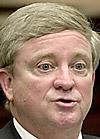Lobbyist had meteoric rise and fall

WASHINGTON — Jack Abramoff liked to slip into dialogue from "The Godfather" as he led his lobbying colleagues in planning their next conquest on Capitol Hill. In a favorite bit, he would mimic an ice-cold Michael Corleone facing down a crooked politician's demand for a cut of Mafia gambling profits: "Senator, you can have my answer now if you like. My offer is this: nothing."
The playacting was a clue to how Abramoff saw himself: the behind-the-scenes power who directed millions of dollars in Indian gambling proceeds to favored lawmakers, the puppet master who pulled the strings of key officials, the businessman who was building an international casino empire.
Abramoff is the central figure in what could become the biggest congressional corruption scandal in generations. Justice Department prosecutors pressed him and his lawyers to settle fraud and bribery allegations this week, sources said. Unless he reaches a plea deal, he faces trial Jan. 9 in Florida in a related fraud case.
This inside account of Abramoff's career is drawn from interviews with government officials and former associates in the lobbying shops of Seattle-based Preston Gates & Ellis and Greenberg Traurig; thousands of court and government records; and hundreds of e-mails.
Abramoff, now 47, sought to build the biggest lobbying portfolio in town. He opened two restaurants close to the Capitol. He bought a fleet of casino boats. He produced two Hollywood movies. He leased four arena and stadium skyboxes and dreamed of owning a pro sports team. He was a generous patron in his Orthodox Jewish community, starting a boys religious school in Maryland.
Abramoff's brash style often clashed with culturally conservative Washington, but many were drawn to his moxie and his money. He collected unprecedented sums — tens of millions of dollars — from casino-rich Indian tribes. Lawmakers and their aides packed his restaurants and skyboxes and jetted off with him on golf trips to Scotland and the Pacific island of Saipan.
Abramoff offered jobs and other favors to well-placed congressional staffers and executive-branch officials. He pushed his associates for government positions, from which they, too, could help him.
He was a man of contradictions. He presented himself as deeply religious, yet his e-mails show that he blatantly deceived Indian tribes and did business with people linked to the underworld.
Money and thrills
Abramoff's lobbying team was made up of Republicans and a few Democrats, most of whom he had wined and dined when they were aides to powerful lawmakers. They signed on for the camaraderie, the paycheck, the excitement.
"Everybody lost their minds," said a former congressional staffer who lobbied with Abramoff at Preston Gates' Washington, D.C., office. "Jack was cutting deals all over town. Staffers lost their loyalty to members — they were loyal to money."
A senior Preston Gates partner warned Abramoff to slow down or he would be "dead, disgraced or in jail." Those within his circle also saw danger signs. He had become increasingly frenzied about money and flouted the rules. "I'm sensing shadiness. I'll stop asking," one associate, Todd Boulanger, e-mailed a colleague.
Abramoff declined to comment for this article.
A quarter-century ago, Abramoff and anti-tax crusader Grover Norquist were fellow Young Turks of the Reagan revolution. They organized Massachusetts college campuses in the 1980 election — Abramoff while he was an undergraduate at Brandeis and Norquist at Harvard Business School — to help Ronald Reagan pull an upset in the state.
They moved to Washington, maneuvered to take over the College Republicans and transformed it into a right-wing activist group. They were joined by Ralph Reed, whose later Christian conversion would fuel his rise to national political prominence.
They forged lifelong ties. At Reagan's 72nd birthday party at the White House, Reed introduced Abramoff to his future wife, Pam Alexander, who was working with Reed.
Even in those early days, there were hints of trouble. Abramoff and his crew busted the College Republicans' budget with a 1982 national direct-mail fund-raising campaign that ended up "a colossal flop," said Rich Bond, a former Republican National Committee chairman. Bond said he banished the three from GOP headquarters, telling Abramoff: "You can't be trusted."
Shortly thereafter, Abramoff was running Citizens for America, a conservative grass-roots group founded by drug-store magnate Lewis E. Lehrman. Abramoff was in frequent contact with Marine Lt. Col. Oliver North, the Reagan White House's Iran-contra mastermind, about grass-roots efforts to lobby Congress for the Nicaraguan contras, National Security Archive records show.
One of Abramoff's most audacious adventures involved Jonas Savimbi, the Angolan rebel leader who had U.S. support but later was found to have ordered the murders of his movement's representative to the United States and that man's relatives. With Savimbi, Abramoff organized a "convention" of anti-Communist guerrillas from Laos, Nicaragua and Afghanistan in a remote part of Angola. Afterward, Lehrman fired Abramoff amid a dispute about the handling of the group's $3 million budget.
Abramoff also worked on behalf of the apartheid South African government, which secretly paid $1.5 million a year to the International Freedom Foundation, a nonprofit that Abramoff operated out of a townhouse in the 1980s, according to sworn testimony to the South African Truth and Reconciliation Commission.
Dabbling in Hollywood
At the same time, Abramoff dabbled as a Hollywood producer, shepherding an anticommunist movie, "Red Scorpion," starring Dolph Lundgren, filmed in Namibia, then ruled by South Africa. Actors said they saw South African soldiers on the set. When the film was released in 1989, anti-apartheid groups demonstrated at theaters. The movie ran into financial difficulty during and after production, but Abramoff produced a sequel, "Red Scorpion 2."
When Republicans won control of the House in 1994, Abramoff turned again to Washington politics. With Norquist's help, Abramoff reinvented himself as a GOP lobbyist on heavily Democratic K Street. Norquist was one of the intellectual architects of the Republican Revolution and a muse for its leader, Newt Gingrich, R-Ga., soon to be House speaker.
Abramoff also counted on his father, who had a wealth of connections from his days as president of the franchises unit of the Diners Club credit-card company. Frank Abramoff once had looked into operating a casino in the Commonwealth of the Northern Mariana Islands, U.S. territory that includes Saipan. He introduced his son around, and the Marianas became one of the first important clients of the new lobbyist.
The younger Abramoff soon developed a key alliance with Rep. Tom DeLay, a Republican from Texas who was working his way up in the House leadership. The two met at a DeLay fundraiser in 1995, according to a former DeLay aide. The aide recalled that Edwin Buckham, then DeLay's chief of staff, told his boss: "We really need to work with Abramoff; he is going to be an important lobbyist and fundraiser."
DeLay, a Christian conservative, did not quite know what to make of Abramoff, who wore a beard and a yarmulke. They forged political ties, but the two men never became personally close, according to associates of both men.
In the Senate, Abramoff befriended Republicans and their staffers, along with some Democrats on the appropriations committees. In August 1999, he signed up for the National Republican Senatorial Committee's "Tartan Invitational," in which a half-dozen Republican senators and their aides joined about 50 lobbyists golfing at the exclusive St. Andrews Links in Scotland.
The following year, Abramoff figured out how to use his clients to fund his own trips to St. Andrews with lawmakers. The first guests were DeLay and his aides.
With Norquist's help, Abramoff secured a spot on the transition team for the Interior Department after George Bush's election as president in 2000. Abramoff tried to place several officials in Interior, including an unsuccessful attempt to land a former Marianas official in the top spot overseeing U.S. territories.
He was able to befriend J. Steven Griles, the deputy interior secretary, e-mails and interviews show. By the summer of 2001, Abramoff was referring to him in an e-mail to a client as "our guy Steve Griles." Federal investigators are looking into whether Griles interceded on behalf of Abramoff and improperly discussed a job with the lobbyist while in a position to affect his clients. Griles denied wrongdoing in recent Senate testimony.
Abramoff's team also cultivated Roger Stillwell, the Marianas desk officer at the Interior Department. In a recent interview, Stillwell said he accepted dinners at Abramoff's restaurant, Signatures, and tickets to Redskins football games. But he said all those actions occurred while he was a contract employee at Interior, not a federal worker. He also said he sent Abramoff copies of e-mails he sent to his boss, but he noted that none contained confidential information.
Abramoff wallowed in his access, real and imagined.
Despite glowing profiles in The New York Times and Wall Street Journal noting Abramoff's extensive influence and impressive income, he paid op-ed columnists thousands of dollars to write favorably about his clients, including one Copley News Service writer who disclosed this month that he had been paid for as many as two dozen columns since the mid-1990s.
Abramoff drove colleagues hard, often e-mailing them late into the night. Many more than doubled their pay with him, some earning salaries of $200,000 to $300,000.
Team Abramoff
Team Abramoff included former staffers to DeLay, as well as to Sen. Conrad Burns, R-Mont., head of the Senate Appropriations panel's Interior subcommittee; Rep. Robert Ney, R-Ohio, chairman of the House Administration Committee; Rep. John Doolittle, R-Calif., who has served on the key House panel that oversees tribes; and current Minority Leader Harry Reid, D-Nev.
Abramoff gathered his troops for strategy meetings that were "a great show," rollicking forums where ethical niceties were derided with locker-room humor, recalled a former Preston Gates colleague.
Bill-padding was discussed openly, according to Abramoff's Greenberg Traurig e-mails that have been released by the Senate Indian Affairs Committee. For example, in April 2001, Abramoff had lobbyist Shawn Vasell working on a monthly invoice to the Mississippi Band of Choctaw Indians, telling him to "be sure we hit the $150k minimum. If you need to add time for me, let me know."
An exasperated Vasell e-mailed back: "You only had 2 hours. We are not even close to this number ... " Abramoff's solution: "Add 60 hours for me," and "pump up" the hours for three or four other lobbyists.
The Choctaws were one of a half-dozen Indian tribes who gave more than $80 million to Abramoff between 2000 and 2003. Not only were the tribes paying Abramoff's lobbying firm, they also were paying Abramoff's secret outside partner, Michael Scanlon, who charged millions of dollars for public-relations work and split the money with Abramoff. Scanlon's public-relations fees did not have to be disclosed under lobbying rules, thus making it possible for the magnitude of their take from the tribes to be kept from public view. The two dubbed their scheme "Gimme Five," according to e-mails in which Abramoff disparaged their clients as "morons" and "troglodytes."
E-mails show that Abramoff put his money into an array of political and personal projects.
He put a congressional spouse — Julie Doolittle, wife of the California lawmaker — on his payroll to plan at least one event.
The nonprofit Capital Athletic Foundation ostensibly was created to help inner-city children through organized sports. There is no evidence money went to city kids, but the foundation did fund some of Abramoff's pet projects: a sniper school for Israelis in the West Bank, a golf trip to Scotland for Ney and others, and a Jewish religious academy in Columbia, Md., that Abramoff founded and where he sent his children to be educated.
But by early 2003, Abramoff's private deal-making had spiraled out of control. His religious academy was draining his income, and his restaurants were hemorrhaging money. He told Scanlon in an e-mail that February that he was at "rock bottom" and needed funds immediately. By the next day, he was frantic. "Mike!!! I need the money TODAY! I AM BOUNCING CHECKS!!!"
'Enron of Lobbying'
To Abramoff's rivals in the niche world of tribal lobbying, however, he was still a confounding success.
Team Abramoff was stealing away tribal clients from other lobbyists and charging fees of $150,000 a month or more — 10 or 20 times what the Indians had been paying to others. Team members did it by touting their ties to powerful Republicans on Capitol Hill and stoking tribal worries that Congress might try to tax casino proceeds. Abramoff and Scanlon also quietly became involved in tribal elections.
Sen. Byron Dorgan, D-N.D., the ranking Democrat on the Indian Affairs Committee, remembers first hearing "vague complaints" about Abramoff in June 2003 from three Democratic lobbyists. The tribes traditionally had supported Democrats, but Abramoff was capturing them for Republicans.
There was even more buzz on Capitol Hill about Scanlon, the gregarious former DeLay press aide who had become a multimillionaire almost overnight. His old friends were astonished that Scanlon, then in his early 30s, was traveling to the beach by helicopter and living in a waterfront Rehoboth mansion that he bought for nearly $5 million in cash. A Louisiana paper, the Town Talk of Alexandria, reported in September 2003 that the Coushatta tribe paid Scanlon's public-relations firm $13.7 million, a figure that amazed tribal lobbyists as well as some of Abramoff's colleagues. One colleague, Kevin Ring, learned from one of Abramoff's assistants about that time that his boss was secretly receiving money from Scanlon, according to a source privy to the conversation.
"This could be the Enron of lobbying," Ring told the colleague.
In early 2004, the Post published a detailed account of Abramoff's tribal lobbying, showing how four of Greenberg Traurig's Indian clients had paid $45 million, most of it in fees to Scanlon's firm. Within weeks, Greenberg initiated an internal investigation, Abramoff was ousted and the Senate Indian Affairs Committee began an inquiry, which unearthed hundreds of incriminating e-mails from Abramoff's Greenberg Traurig computer files.
Abramoff had another problem that few people in Washington knew about.
He and another old friend from College Republican days, Adam Kidan, in 2000 had purchased a fleet of Florida casino boats for $147.5 million. By 2004, SunCruz Casinos was bankrupt, and the two men were being sued by lenders for $60 million in loan guarantees, accused of faking a wire transfer for the $23 million they had promised to put into the deal.
Even more serious, Abramoff and Kidan were targets of a Florida federal grand jury investigating the SunCruz wire transfer. And local authorities were probing the gangland-style slaying of the man who had sold them the cruise line, Konstantinos "Gus" Boulis.
By the spring of 2004, the Justice Department had launched an investigation of Abramoff and Scanlon that quickly developed into a multi-agency task force.
Nearly two years later, Abramoff's legal troubles appear to threaten the careers of many of his colleagues and political allies. Sources say a half-dozen lawmakers are under scrutiny, along with congressional aides, former business associates and government officials.
Two of Abramoff's former business partners — Scanlon and Kidan — have pleaded guilty and have agreed to testify about bribery and fraud in Florida and Washington.
Three men have been arrested in the Boulis killing. Two were Kidan's associates; one is known to law enforcement as an associate of the Gambino crime family.
Another former Abramoff associate, David H. Safavian — most recently head of the Office of Federal Procurement Policy in the Office of Management and Budget — has been indicted on five felony counts of lying to federal investigators about his dealings with Abramoff while Safavian was chief of staff at the General Services Administration.
Within the past year, Abramoff began selling assets and has told his lawyers he is broke. He faces the possibility of lengthy jail sentences and stiff financial penalties that could be reduced if he cooperates.
Dozens of lawmakers — who were showered with trips, sports and concert tickets, drinks and dinners — are returning campaign contributions from Abramoff and his clients and calling him a fraud and a crook.
Burns, of Montana, one of the legislators under scrutiny by the federal Abramoff task force, returned $150,000 in campaign contributions this month.
"This Abramoff guy is a bad guy," the senator told a Montana television station. "I hope he goes to jail and we never see him again. I wish he'd never been born, to be right honest with you."
Post researcher Alice Crites contributed to this report.




